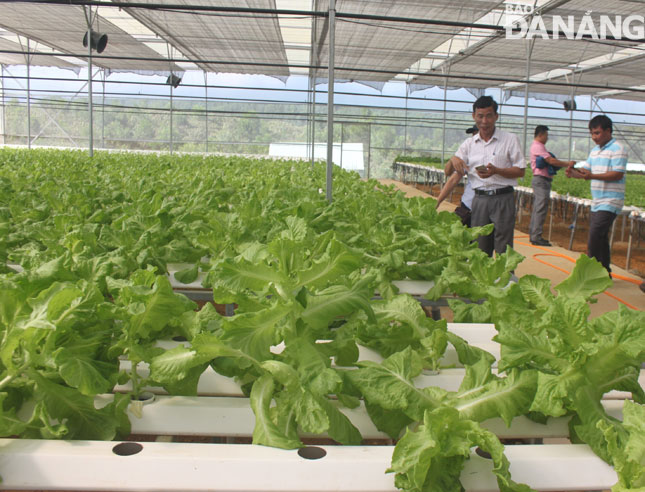Promoting the development of hi-tech agriculture
The application of high technology into agriculture in order to enhance the productivity and quality of agricultural products is considered an inevitable development trend in the burgeoning world. Therefore, Da Nang is appealing for more agencies and businesses to invest in this aspect.
 |
| Hi-tech fruit and vegetable production models in Hoa Ninh Commune bring high- economic efficiency. |
In April 2017, the municipal authorities gave the green light to the development of 7 hi-tech agricultural projects, covering a total area of over 500ha in the city.
One of them is a 40ha hi-tech agricultural production area in Hoa Vang District’s Hoa Ninh Commune which specialises in growing vegetables, flowers, and herbal plants.
Taking the advantages of natural conditions and the initial success of hi-tech agricultural production models in Hoa Ninh Commune, the city authorities have approved the establishment of another 140ha hi-tech agricultural production area in the commune’s Trung Nghia Village. The newly-established area is very attractive to domestic investors.
Some investors remarked Da Nang is a tourism hub when it has attracted a large number of domestic and foreign visitors to stay and go swimming. In addition to discovering the beauty of the city’s inviting places, visitors don’t miss eating local delicious food. Therefore, Da Nang is considered as a potential consumption market for hi-tech agricultural products.
In attempting to attract even more investment into technology-based agriculture, the local authorities have issued numerous preferential policies for investors.
In particular, investors will be funded 50% of the costs of site clearance, with a maximum of 3 billion VND per project, and 50% of the costs of infrastructure construction, with a maximum of 2 billion VND per project.
Director of the city’s Agro-Forestry-Fishery Promotion Centre Dang Van Hong noted the hi-tech applications in the city’s agriculture have yet to meet the expectations of some agricultural experts. Unplanned and small-scale production, and the instability of agricultural product supply are considered main barriers to expanding the city’s consumption markets and building its own brand name.
He, therefore, underlined the significance of restructuring the agriculture, with a focus on enhancing the added value of agricultural products and upgrading rural areas across the city in an effective and sustainable manner. Importance should be attached to setting the city’s target of each ward/ commune having its own key product with specific advantages.